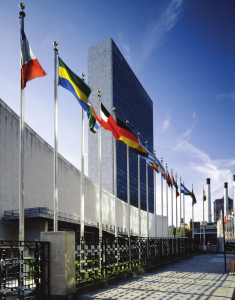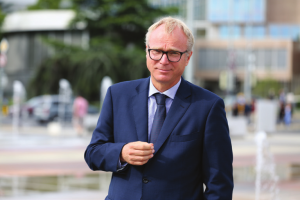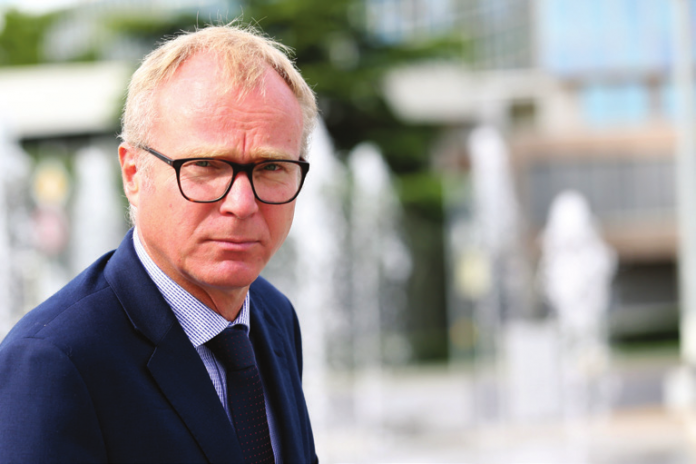A l’occasion du 15e anniversaire de la votation du 3 mars 2002 sur l’adhésion de la Suisse à l’ONU, l’Ambassadeur Valentin Zellweger, représentant permanent de la Suisse auprès des Nations Unies et des autres organisations internationales à Genève, fait le point sur les années passées et l’importance de la Genève Internationale.
Quinze année après l’adhésion de la Suisse aux Nations Unies, quel est le bilan ?
Le bilan est très positif. Tous les espoirs qui étaient liés à notre adhésion ont été réalisés. Tout se passe avec une grande convergence. L’ONU s’est avérée être un complément de notre politique étrangère. La Suisse est rapidement parvenue à se faire une place au sein de l’organisation. Elle y est respectée en tant que membre actif, constructif et solidaire.
La Suisse a fait partie des derniers états à adhérer à l’ONU en 2002.
Effectivement, son adhésion a constitué un soulagement pour les Nations Unies et depuis lors le pays a joué un rôle très constructif. Nous avons non seulement beaucoup contribué en termes d’idées mais aussi d’initiatives et d’énergie. On peut citer en exemple la création du Conseil des droits de l’homme à Genève.

Quelles qualités ont permis à la Suisse de se faire une place?
Le pragmatisme, la flexibilité et la fiabilité suisses sont fortement reconnus au sein du système des Nations Unies. A cela s’ajoute l’absence d’un agenda caché et au fait que notre passé ne nous contamine pas aux yeux d’autres pays car nous ne sommes pas engagé dans le colonialisme. On doit également avoir l’ambition de continuer à jouer un rôle constructif, à dire des vérités que d’autres n’osent pas dire et à œuvrer pour que les défis soient relevés.
L’adhésion aux Nations Unies a-t-elle renforcée l’image de Genève ?
Parfaitement. L’engagement à l’ONU permet aussi de valoriser la Genève internationale, hôte d’une concentration unique d’acteurs internationaux, comme lieu de gouvernance globale.


« A l’heure d’importants bouleversements dans le monde, face aux crises humanitaires de plus en plus complexes et au vu des défis croissants auxquels fait face notre planète, la Genève internationale offre un cadre idéal pour trouver des solutions consensuelles et communes. Sa concentration unique d’acteurs internationaux et son potentiel de synergies et de complémentarités confèrent à Genève une position privilégiée sur l’échiquier politique et économique mondial. »
Actuellement se tient la 34ème Session du Conseil des droits de l’homme au cours de laquelle la Suisse occupe la vice-présidence. Avez-vous des objectifs prioritaires ?
Le thème qui nous tient toujours à cœur est celui de l’abolition de la peine de mort. Mais, pour le moment, nous nous concentrons sur la situation dans certains pays. Nous sommes très préoccupés par ce qui se passe en Syrie. Cette session verra, entre autres, la présentation du nouveau rapport de la Commission Indépendante d’enquête sur la Syrie. Ce sera le premier document présenté depuis la chute d’Alep. La Suisse a œuvré durant plusieurs années pour que le Conseil de Sécurité saisisse la Cour pénale internationale sur la situation en Syrie. Cela n’a pas été possible à cause de la mise de vetos. Mais un nouveau mécanisme d’enquête pénale sur la Syrie vient d’être établi à Genève. Il devra veiller à ce que l’impunité qui règne connaisse une fin. C’est une première expérience dans le domaine.
La Suisse constitue une plateforme neutre pour les négociations de Paix. Est-ce que cet outil est plus sollicité ?
Si la situation mondiale se complique et si les fronts se durcissent, un besoin croissant d’un endroit dont la neutralité est absolument incontestée sera nécessaire. Genève a une tradition dans le domaine.
Genève n’est pas uniquement la ville des agences du système des Nations Unies, elle regroupe également d’autres cercles très dynamiques. Il semble que vous soyez très attentif à l’élargissement de leur participation aux « affaires internationales » ?
Des progrès très importants ont été accomplis dans ce domaine ces dernières années. On se rend compte que les gouvernements n’arrivent plus à résoudre, seuls, les problèmes de ce monde. Il est donc important d’élargir le cercle de ceux qui s’impliquent et participent à la formulation des solutions. Il s’agit des mondes, académique, de la science, de l’innovation, le secteur privé, la santé et la société civile. A ce titre, Genève est idéale car tous ces acteurs sont non seulement représentés en force dans la ville mais l’esprit très pragmatique qui règne ici facilite le dialogue et la coopération.
Comment procédez-vous ?
La Confédération et le Canton de Genève ont encouragé des nouvelles formes de dialogue par la création de plateformes dans le domaine humanitaire, de la Paix, de l’environnement, de la santé. Elles servent de vaisseaux pour trouver des solutions communes. Certains appellent cet ensemble « la Genève Intellectuelle » et celle-ci devient indispensable à la « Genève Internationale » pour trouver des solutions pour demain.
« Genève est une ville internationale à vocation universelle. Elle héberge le second siège des Nations Unies, ainsi que 34 autres institutions et organisations internationales. 175 Etats y sont représentés, ainsi que 256 représentations permanentes. La société civile est active à travers plus de 250 organisations non-gouvernementales. Avec quelque 2’400 réunions annuelles auxquelles participent près de 200’000 délégués venant du monde entier, Genève est le centre de conférences internationales le plus important du monde. La Suisse est déterminée à constamment adapter et améliorer les conditions-cadres pour l’accueil des institutions internationales. » V. Zellweger


